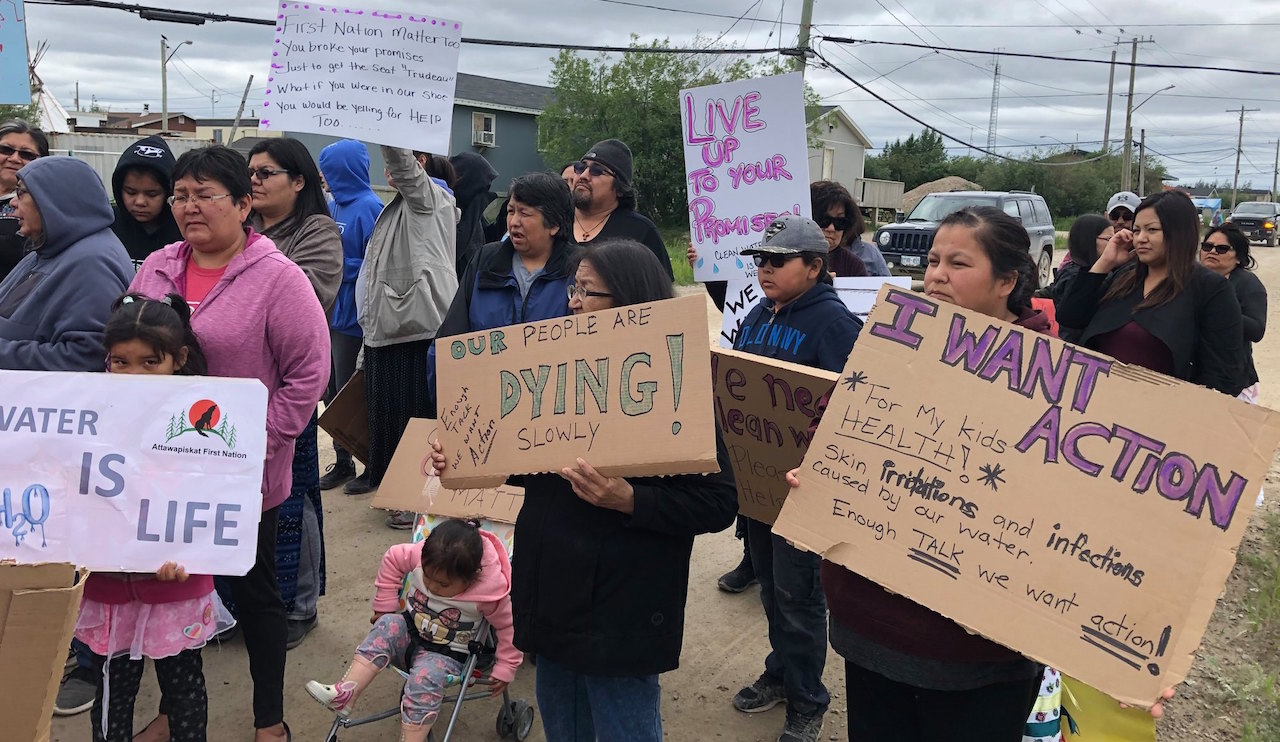Three weeks after Attawapiskat declared a state of emergency over its water quality and 14 days into a hunger strike to demand accountability, there are no signs of concrete actions from the federal government to address the water crisis in this First Nations community.
On July 9, Attawapiskat declared a state of emergency: dangerously high levels of trihalomethanes (THMs) and haloacetic acids (HAAs) were detected in the water, and residents were advised against bathing for too long or using the water to wash food. In a report by Human Rights Watch, regular exposure to high levels of these chemicals can cause health impacts ranging from gastrointestinal disorders to increased risk of cancer.
Frustrated by the “piecemeal approach to longstanding and ongoing crisis,” former chief Theresa Spence and band council member Sylvia Koostachin-Metatawabin went on a hunger strike starting on July 14. In a statement titled “Life Carriers,” they stated:
“We are requesting a Task Force Working Group be formed on an immediate basis and to seriously look at the urgent needs of our community. As community members, we see firsthand and experience the deficiencies of our communities, and by creating a task force, we can all work together to bring about solutions to these deficiencies on an immediate, short-term and long-term basis.”
The visit from Indigenous Services Minister Seamus O’Regan last week was met with a march from 50 women and children from the community, demanding an end to their long-term water crisis. One week later, the community has yet to see concrete action following the minister’s promise to address the crisis.
Former Chief Spence and Koostachin-Metatawabin called for a Task Force Working Group to immediately address the issues in the community. Among the requests are $12.2 million in funding to upgrade the water treatment plan, medical assessments for members of the community affected by the chemicals, regular water monitoring, and bottled water to households until drinking water is safe again.
Attawapiskat is one of many First Nations communities that lack access to safe and clean drinking water, despite the federal government’s commitment to ending long-term drinking water advisories in First Nations communities by 2021. A visit from a public health official last week points to deeper-rooted issues, namely substandard housing and sewage treatment, issues that Attawapiskat shares with many other remote First Nations communities.
Former Chief Spence and Koostachin-Metatawabin’s hunger strike also drew attention to the systemic, discriminatory underfunding of First Nations infrastructure, from water to housing, education and health services. “For too many years, our community has suffered from a colonial structure that promote the continued injustice, discrimination and next to poor standards from a legislated policy that controls, dictates and always seems to provide solutions for our lives.”
In fact, the federal government’s piecemeal approach to many crises facing First Nations has not only compounded the problem, but also significantly hindered First Nations’ ability to self-govern and develop their own solutions. “The mould, water and housing crises are all problems created by the federal government’s chronic discriminatory underfunding — which continues despite the known impact on the health and lifespan of First Nations people,” says Mikma’k lawyer and scholar Pam Palmater.
Former Chief Spence and Koostachin-Metatawabin reminded us:
“We live under a controlled colonial system of governance, and this has to change — no, it must change! We are a sovereign Nation, a Nation with a rich, vibrant and diverse history. We must take control of our destination and need not be afraid of voicing our concerns anymore.”
It’s time for the government to fulfill their promise and provide safe, clean drinking water to Attawapiskat, and centre the community in developing solutions. Write Justin Trudeau (justin.trudeau@parl.gc.ca) and Seamus O’Regan (seamus.oregan@parl.gc.ca) to demand justice for Attawapiskat now!
You can follow the updates on the hunger strike from the Reclaiming our Steps Past, Present and Future Facebook page.
Vi Bui is Water Campaigner with the Council of Canadians. This artice was first posted on the Council of Canadians blog.
Photo from Reclaiming our Past, Present and Future Facebook page.



